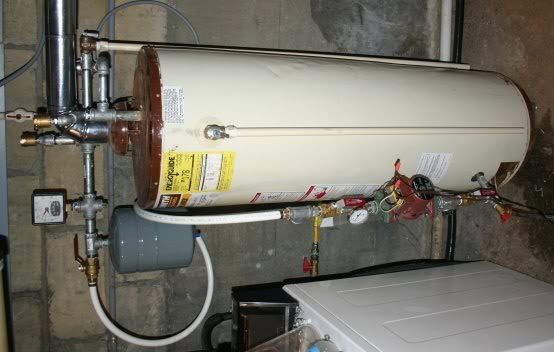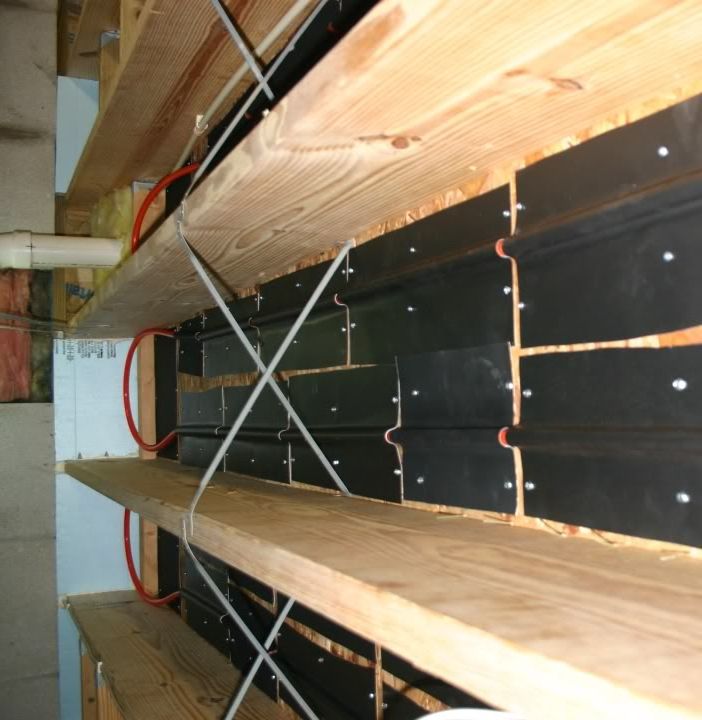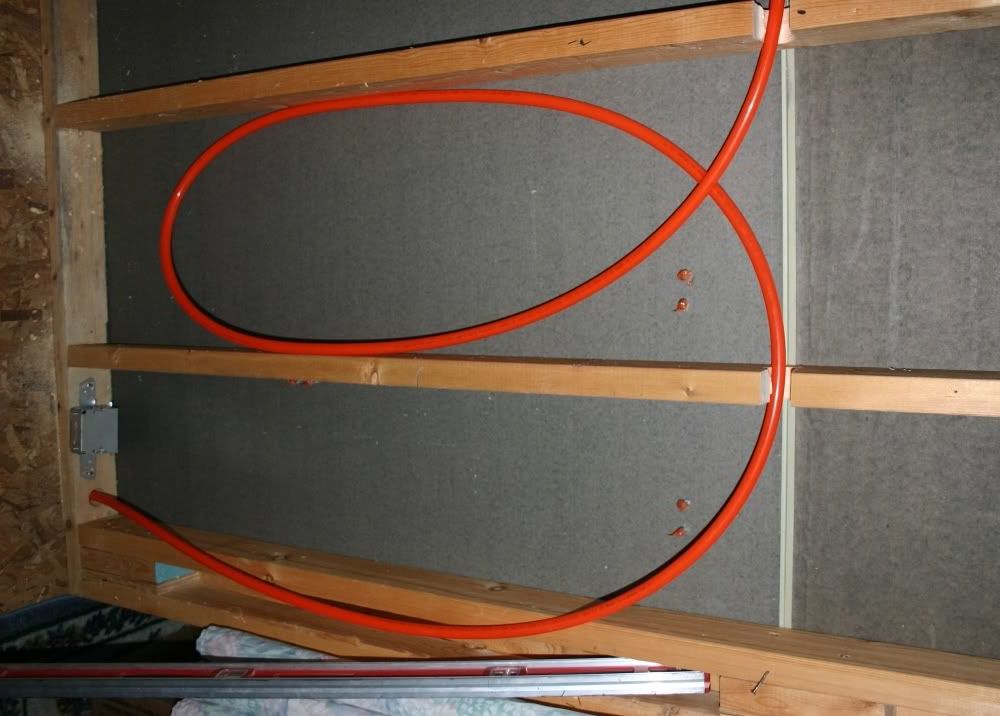Page 1 of 2
Radiant Floor Heat for my house
Posted: Mon Nov 06, 2006 2:50 pm
by SafariRob
Anybody out there have radiant floor heat in their house? I've decided to go that route with the first floor in my place and would like to hear of any experiences.
I converted my house to hydronic baseboard heat back in '85, so I have the boiler already. I'll be retaining the baseboard radiators upstairs since I'm not going to tear up the 1st floor ceilings to install the PEX tubing for the 2nd floor.
Any thoughts or considerations graetly appreciated.
Posted: Sat Dec 02, 2006 12:51 pm
by SafariRob
Guys, I haven't been doing much on the board because this floor project of mine is taking all my time ( and bucks!). As usual, any project that I think will take no time at all will end up hogging all the time available.
I've been reading everything about radiant floor heating I can find when I'm not wallowing around in the crawl space putting the PEX tubing in place. The PEX installation seemed like an easy job--after all, how tough can running plastic 1/2 inch tubing be? Well, if that tubing happens to be PEX, it can be plenty tough. That stuff has a mind all of its own and is determined to keep its coiled shape. It's flexible to a point, but pass that threshold and you've kinked it badly. Which I did. The fix is to heat the kinked area with a heat gun until the tubing reforms itself, which amazingly it does.
Since we're in the heating season, I didn't want to shut down and drain the boiler to add another loop. Doesn't sound like it would take long to add the loop, but I know better. Plus, the boiler's output is too hot for heating the floor, so tempering valves need to be used. Sounds like some experimentation will be needed to get things right--more time needed while the boiler isn't heating the house.
So, I got a natural gas water heater given to me and figured I'd turn it into a boiler just to prove the floor heating concept while leaving the house's boiler alone. Essentially, I've added a circulation pump, expansion tank, and a 30 psi popoff valve to the water heater and--voila!--it has become a boiler. The idea is this: the water heater will maintain its 40 gallon tank at whatever temperature the knob on the gas valve is set at; just like any water heater does. But a wall mounted thermostat will control the circulation pump and thereby the floor temperature.
So far, I've got the heater ready to go, it's just a matter of getting the PEX plumbed in. Sure sounds simple!
I hope to have one 250 ft loop of PEX delivering heat to the north end of the house by tomorrow evening.
Posted: Sat Dec 02, 2006 1:01 pm
by peter
I'd love to be able to give you some advice, Robby. Fact is, I have no experience in this field whatsoever. I do know that those with radiant heating state that the temp levels are very consistent and comfy. Claims of energy savings (according to articles I've read) are very "optimistic", however. It won't cost you more in energy, to be sure. Just don't expect to slash your bill in half.
As well, it's very important to use a thermostat designed for radiant heating. Again, this is based on what I've read, not quite sure why.
Good luck

Posted: Sat Dec 02, 2006 1:42 pm
by SafariRob
Thanks for the input, Peter. I don't really have my hopes up for any gas savings, I'm looking to make the house more comfortable and heat coming up from all over the floor has just got to be the way to go.
Here's a photo of FrankenHeater. As you can see, it's sprouted some boiler parts. The white tubing on the left is a piece of 3/4" PEX that I used to connect the supply port to the return port so I could check for leaks while running the circulator pump.

This photo is of the underside of the floor. The orange is the PEX tubing and the flat black is the emission plates. The plates are made out of .030" soft aluminum which I bought by the 4x8' sheet at a welding shop. I made a jig to bend the aluminum to fit around the tubing. The plates are there to extract the heat from the PEX and spread it over the subfloor to cut down on floor temperature gradients. The secondary job of the plates is to hold the PEX against the subfloor. I used 3/8ths" sheet metal screws to fasten the plates up against the subfloor. I painted the plates flat black because it seemed like the thing to do. Nowhere have I read that this is necessary. In fact, painting the plates has never been mentioned in anything I've read concerning radiant heat. What not yet complete is the installation of the radiant barrier under the emission plates. The radiant barrier is absolutely necessary or the floor will barely heat. The barrier is a product made of two shiny aluminum foil sides sandwiching double bubblewrap. It's usually referred to as "FBBF" and that translates to "Foil Bubble Bubble Foil". I'll be using the Reflectix brand of FBBF. I n this application, the FBBF has an R value of nearly 17. Since I'll be insulating the crawl space walls with 2 inches of foam board, the Reflectix R value should be enough.

Next is a shot of how the interior bathroom wall will be heated by the PEX. Each wall cavity will have a loop. What's not yet installed is the emission plates. The purpose here is to make the lower half of the wall a radiator which should help to make the bathroom nice and cozy.

So that's what's going on. I'll let you know how it all works out.
Posted: Sat Dec 02, 2006 1:57 pm
by SafariRob
One other thing and this surprised me... I filled the tank and turned on the gas to FrankenHeater and lit the pilot. I then turned on the burner and 1 hour and 20 minutes later the burner shut off with a water temp of 120F. I powered on the circulator pump and checked for leaks...all was good, fortunately.
But I might not want the water temp at 120F, so I decided to turn off the burner gas, wait for the water in the heater to cool, and then start the burner again at the lowest knob setting and see what the temperature stabilized at. Figured it would take maybe 8 hours to cool.
How very wrong I was about that. It's been two weeks now in a cool basement and the water temp inside the heater is at 84F. This blows me away; there's a constant draft being pulled through the heater by the chimney and the basement is around 65F. I never knew that a common water heater was insulated that well, especially this one, which is dated 1991. It seriously has me rethinking the common thought that keeping 40 gallons of water up to temperature is a waste of energy and that a tankless water heater is the way to go.
Posted: Sat Dec 02, 2006 2:20 pm
by astrozam
Interesting project Rob, If radiant wall heaters can make a home much more comfortable than forced air heating, I'm going to go out on a limb and assume that your floor heating is gonna kick ass and make your place very comfortable, thanks for keeping us up to date on how its coming along.
Posted: Sun Dec 03, 2006 6:06 pm
by SafariRob
Spent the whole day getting the PEX into the bathroom walls--never thought it would take that long, but that stuff really can put up a fight. Woe to you if you get a twist into the tubing; it'll take a lot of massaging to get the tubing to lay how you need it to be.
So, not connected up to the mutant water heater tonight.
Maybe in a couple of days...
Posted: Thu Dec 21, 2006 1:58 am
by SafariRob
I've been working like a maniac on this heating project and have finally got it working in the bathroom. Sure were some changes along the way to making that simple statement, but the warm floor is certainly nice.
When I first fired it up one problem really let itself be known quickly--the circulation pump cavitated. Wasn't too hard to figure out that something was wrong as the water flow stopped and the pump got very noisy. As it turned out, the problem was trapped air in the water. I thought my homemade air separator ( actually just a pipe tee and an air bleeder valve) would take care of the air, but the air had other ideas. So, it was time to get a proper air separator, which cost me $18. Had to disassemble all the pipework on the heater's supply side to plumb in the separator, but the results were definitely worth it; not a peep of cavitation out of the pump since installing the separator.
The real work was in the crawl space, though. I've spent days in there fitting foam insulation board and stapling up the radiant barrier. That part is finished under the bathroom and I'm really tired of flopping around in the crawl space, so it's time to take a breather and watch how all works. My neck muscles sure need a break from the crawl space.
Posted: Thu Dec 21, 2006 8:59 am
by mdmead
Cool project!
Posted: Thu Dec 21, 2006 12:12 pm
by e7ats
mdmead wrote:Cool project!
No, warm project.
Look'n nice.
Posted: Sun Dec 24, 2006 8:36 pm
by SafariRob
Well, the floor heat in the bathroom has been working for a couple of days now. I must admit that a warm floor is very nice, but it's a very subtle form of heating. The outside temperatures have been very warm for this time of year, so it's hard to tell how the radiant heat will do when it gets really cold, but I'm doubting that the radiant heat will be able to keep the bathroom up to temperature. I should mention that the bathroom has a large skylight in the middle of the ceiling and that's certainly a detriment to any form of heating. Could be that I need to add more insulation below the PEX in the crawl space.
One other thing; a used water heater isn't the way to go, even if it's only temporary. This water heater, at any rate, is pretty lazy about keeping water at a set temperature. I have the water heater knob set for 120F, but the water has to drop to 105F before the burner kicks back in and brings the temp back up to 120F. Next winter I intend to have the boiler providing the heat and I'm sure it'll have no problem with temperature control.
Posted: Mon Dec 25, 2006 4:56 am
by peter
Very interesting project, Rob. As far as whether it'll keep the washroom warm enuf, I think it'll do fine. It is frustrating though, it almost seems like ole man Winter is purposely teasing us. I changed over to a Dual-Rate program with the local electric company. I did alot of control mods myself and need to have the outdoor temps drop below -12*C (which I think is around +10*F) so as to assure that the heating system auto-switches from electrical to propane gas. If you saw the gizmos I've got going here, you'd all have me locked up....
Posted: Sat Jan 13, 2007 3:17 pm
by SafariRob
Well, had the radiant heat on in the bathroom for several weeks now. My wife is wild about it; I must admit that it sure is nice having a warm floor under my bare feet in the morning. But I told my wife, "Aw, this radiant heat thing isn't working out, I think I'll shut it off." Her reply, "No you won't! When are you going to do the rest of the house?" Like I said, she likes it. Now I got to get the front crawl space cleaned out and get at it.
I'm not looking forward to getting in there, it's nasty.
Posted: Sat Jan 13, 2007 3:30 pm
by peter
Good for her, and my condolences to you. In retrospect, I suppose you asked for it though....LOLOLOLOL
Posted: Mon Jan 15, 2007 3:05 pm
by astrogurl
I'm with Peter....the reward for good work is MORE work!


